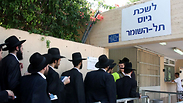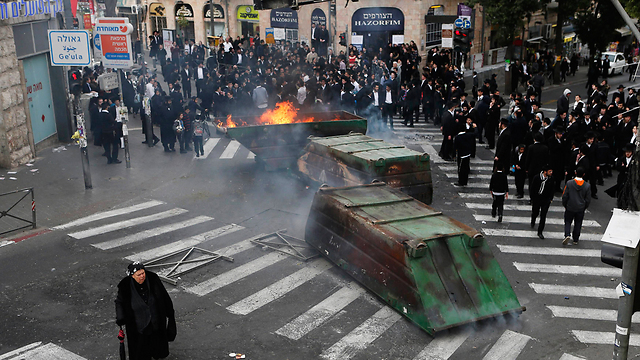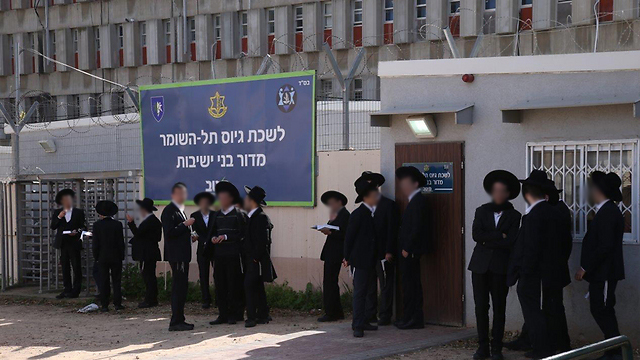
IDF revokes exemptions of 4,000 yeshiva students found to lead secular lifestyle
Search on social media found photos of many ultra-Orthodox men in immodest clothing at the beach, partying on the weekend, or socializing with women; some have already been drafted.
Since August 2015, the IDF has increased its enforcement of the Israeli Defense Service Law, which was amended in 2014 by the previous government in an effort to increase the number of ultra-Orthodox (Haredi) men serving in the army.
According to a senior official in the IDF's Manpower Directorate, some 4,000 ultra-Orthodox men aged 17-24, who received an exemption from military service so they could study Torah, have been found to be living a secular lifestyle.
These young men did not meet the quota of 45 hours a week of studying at a yeshiva that is recognized and supervised by the Education Ministry and therefore lost their status as yeshiva students.
This means those young men will now be drafted to the IDF, with most having already received military orders. Some have even begun their service.
The senior official said hundreds have appealed the decision, with some providing proof they do meet the criteria as yeshiva students and having their exemption reinstated.
In a handful of cases, the IDF's Criminal Investigation Division (CID) arrested ultra-Orthodox men who refused to enlist, leading to protests outside military prisons and courts.
The IDF has been using private investigators to help expose the draft dodgers, as well as applying similar methods to ones used in its campaign against young women who have been easily obtaining exemptions from military service on account of their religious beliefs, even though they too were found to be leading a secular lifestyle.
Soldiers from the Manpower Directorate have been scouring social media pages of ultra-Orthodox youth and discovering photos on Facebook showing thousands at the beach in clothing considered immodest by the Haredi sector, partying over the weekend and socializing with young women. All of this was documented by the young men or their friends and posted to social media.
"Many in the Haredi sector have a Facebook page," the military official explained. "As soon as we realize that the young man does not meet the conditions for exemption, we revoke it after summoning him for a hearing in which we present him with the evidence and allow him to appeal the decision. Going abroad or working instead of studying at the yeshiva are also considered violations of the requirements. We receive the information from different sources. The only thing that has changed is our ability to enforce using technological measures, while also sharing information with the Education Ministry. This is how we 'reach' people."

He went on to say that "We give the time to study to whoever needs it. We've discovered a lot are registered to a yeshiva, but don't actually attend. We've always enforced—what's new today is the use of social media in ultra-Orthodox society. We can easily reach them on Facebook and can do a lot of detective work using a smartphone."
The Manpower Directorate official stressed that falsely declaring oneself as a yeshiva student is a criminal offense, but that the IDF has decided not to file complaints with the police against these draft dodgers. "We don't want to flood the police (with complaints), and that is not at the top of our priorities. The very fact the yeshiva student status has been revoked and the young man will be drafted is the most significant achievement we have."
According to the official, the yeshivot (over 1,000, both national-religious and ultra-Orthodox) whose students are found to be lying about attending them receive letters from the IDF with demands for clarification.
"In one instance, the handling of a yeshiva was transferred to the Defense Ministry so the minister can decide whether to revoke its status," the official said. "Anyone whose exemption was revoked and fails to enlist on the day he was assigned is arrested by the CID and brought to the induction center—just like anyone else."
The official said that while he didn't think the enforcement activity could put an end to the ultra-Orthodox draft dodgers phenomenon, the army will still be able to reach most dodgers. "In this way, we allow the ultra-Orthodox society and the ultra-Orthodox youth to integrate better into the general society and the job market."
'The IDF is stricter than Hazal'
One example of the stricter enforcement is A., a young Haredi man whose yeshiva student status was revoked by the Manpower Directorate. Now, he's appealing the decision, claiming he has returned to the straight and narrow and is now a proper yeshiva student.
In a letter sent to the IDF, his lawyer Menachem Shtrauber claimed that his client did not receive a proper hearing as he was denied the right to be heard. In addition, the committee that made the decision to revoke A.'s status did not produce a record of the meeting.
"Only during the hearing itself was he shown the 'incriminating' evidence, without allowing him to prepare for that in advance," Shtrauber claimed.
Regarding the military's claims that it found "secular" photos of A., the lawyer claimed that "my client has gone through a difficult period of his ultra-Orthodox life, something which is not unusual in the intensive religious life that focus on a constant struggle against desires and urges, which in its very nature also includes failures. In the yeshiva, such moments are referred to as submission to desires and urges and even dubbed 'crisis.' The yeshiva considers this 'crisis' as reaching a low point in order to climb back up."
Shtrauber added that "a guy who experiences a 'crisis' will get a period of grace, being treated with forgiveness by the heads of the yeshiva who try to support him, including as he struggles to get out of the 'crisis.' Indeed, my client has sinned, and recognizes that certain times in his life were not lived based on religious demands or even his expectation of himself. He abandoned the road of sins in light of the religious ruling that only 'He who confess and forsakes (sins) will find mercy.' The military is being more strict than the Hazal (the sages of the Mishna and the Talmud), who said 'Even though he has sinned, he is still a Jew.'"











